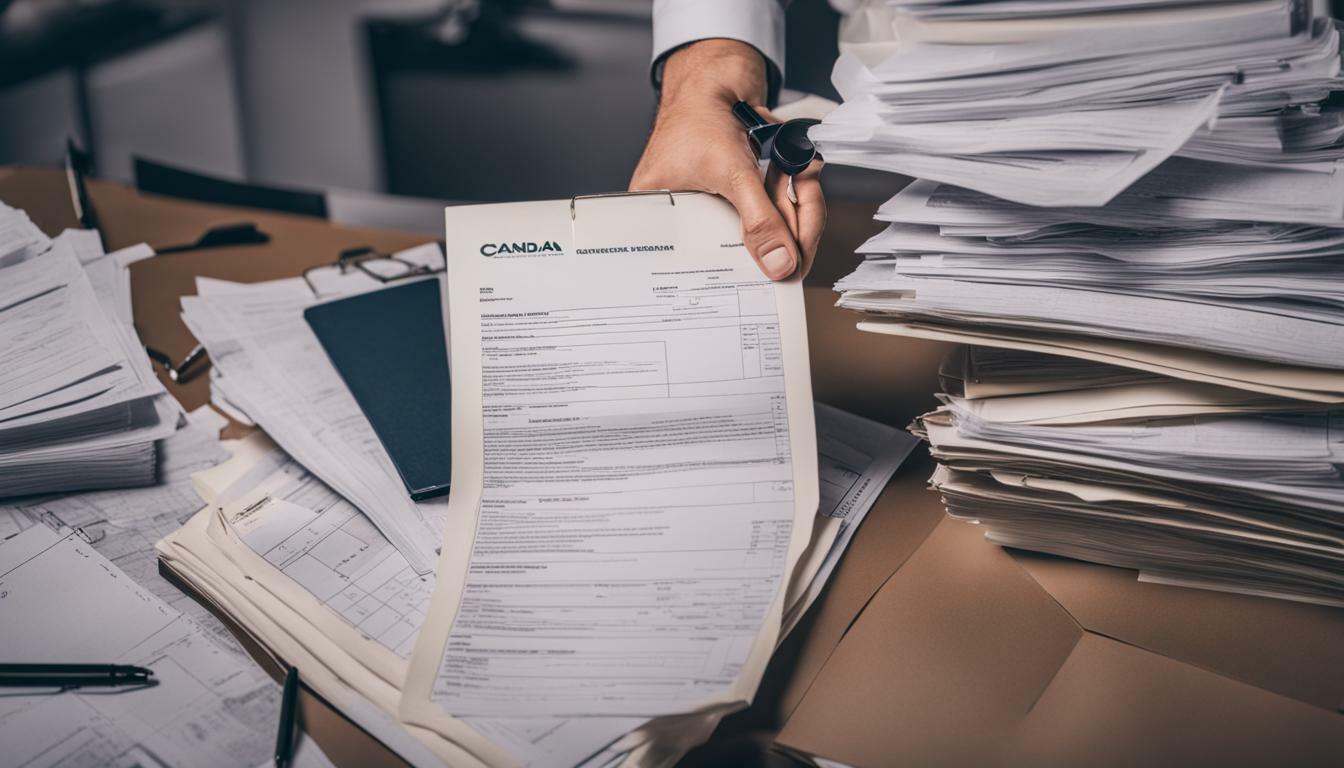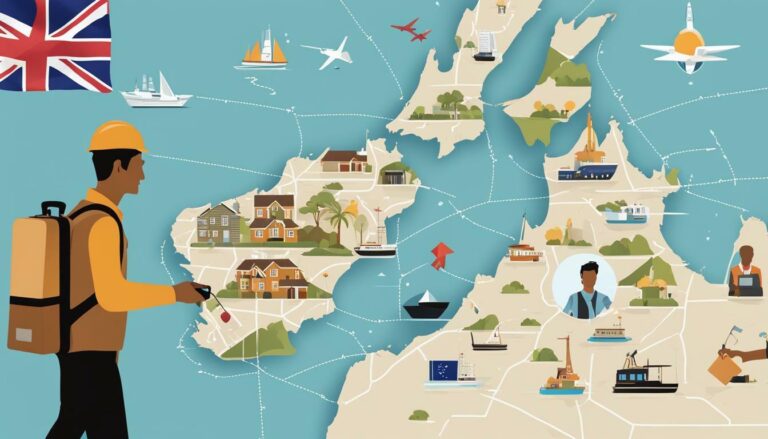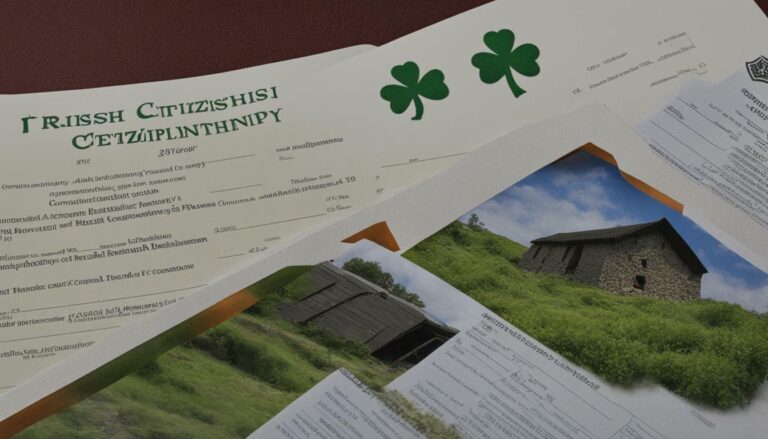Unpacking What Documents Are Needed for Canada PR
When applying for Canada PR, there are several important documents that you need to prepare. These documents are crucial to successfully navigate the application process and ensure a smooth transition to becoming a permanent resident. Understanding the document requirements is essential, as missing or incomplete documents can lead to delays or even denial of your application.
Key Takeaways:
- Valid passport is required for all applicants.
- Confirmation of Permanent Residence (COPR) document is essential to prove your status as a permanent resident.
- Not all applicants require a permanent residence visa, so it’s important to understand specific requirements based on your situation.
- Proof of funds is necessary to support yourself and your family as a new permanent resident.
- Medical examination results are required to ensure you meet health standards set by the Canadian government.
Canada PR Document Checklist
To help you stay organized, here is a checklist of documents required for your Canada PR application:
- Valid Passport: A passport is essential as it serves as your identification and is required for international travel.
- Confirmation of Permanent Residence (COPR) Document: The COPR document is a critical proof of your status as a permanent resident. Ensure you have a copy.
- Permanent Residence Visa (if applicable): Not all applicants require a visa, but if you do, make sure to obtain it before submitting your application.
- Proof of Funds: You need to provide evidence that you have enough funds to support yourself and your family as a new permanent resident.
- Proof of Medical Examination Results (if required): Medical examination results are necessary to ensure that you meet the health standards set by the Canadian government.
- Proof of Job Requirements (for Work Permit Holders): If you hold a work permit in Canada, you need to provide documentation indicating that you meet the job requirements.
- Letter of Introduction (for Work Permit Holders): This letter is issued to work permit holders and serves as proof that you have been authorized to work in Canada.
- Letter of Acceptance from a School (for Study Permit Holders): If you are a study permit holder applying for permanent residency, you must provide a letter of acceptance from a school in Canada.
- Evidence of Visitor Visa or Electronic Travel Authorization (eTA) (for Study Permit Holders and Work Permit Holders): If applicable, you need to show proof of a visitor visa or eTA for entry into Canada.
It is important to note that proof of vaccination is no longer required for travel to Canada. Additionally, as a newcomer, you are allowed to bring your belongings with you. However, it is essential to fill out a Canada Border Services Agency (CBSA) declaration to legally declare any large assets and adhere to border regulations, especially concerning food items.
By gathering all the necessary documents and following this checklist, you can ensure that your Canada PR application process goes smoothly and increases your chances of a successful outcome.
| Document | Requirement |
|---|---|
| Valid Passport | Essential for identification and international travel |
| Confirmation of Permanent Residence (COPR) Document | Proof of permanent residency status |
| Permanent Residence Visa (if applicable) | Required for certain applicants |
| Proof of Funds | Evidence of financial capability to support yourself and your family |
| Proof of Medical Examination Results (if required) | Evidence of meeting health standards |
| Proof of Job Requirements (for Work Permit Holders) | Evidence of meeting job requirements |
| Letter of Introduction (for Work Permit Holders) | Proof of authorization to work in Canada |
| Letter of Acceptance from a School (for Study Permit Holders) | Evidence of acceptance into a Canadian school |
| Evidence of Visitor Visa or Electronic Travel Authorization (eTA) | Proof of entry authorization for study permit and work permit holders |
Confirmation of Permanent Residence (COPR) Document
The Confirmation of Permanent Residence (COPR) document is a vital piece of documentation that proves your permanent resident status in Canada. It is issued to successful applicants who have been approved for permanent residency. This document serves as official confirmation from the Canadian government that you have met the requirements for becoming a permanent resident. It is important to note that the COPR is not a travel document and should not be mistaken for a visa or entry permit.
The COPR contains essential information such as your name, date of birth, and unique identification number. It is recommended to keep multiple copies of this document in a safe and secure place, as you may need to present it for various purposes throughout your time as a permanent resident. It is also a good idea to make digital copies of the COPR and store them electronically, ensuring you always have access to the document when needed.
When entering Canada, it is imperative to present your COPR document to immigration officials. This will allow them to validate your status and grant you entry into the country as a permanent resident. In addition, the COPR document is required when applying for various benefits and services, such as obtaining a Social Insurance Number (SIN), healthcare coverage, and opening a bank account. Therefore, it is crucial to keep your COPR safe and readily available at all times.
Table: Documents required for different types of applicants
| Applicant Type | Required Documents |
|---|---|
| New Permanent Residents |
|
| Work Permit Holders |
|
| Study Permit Holders |
|
It is important to gather all the necessary documents and ensure they are up to date and valid before starting your journey to Canada. Failure to provide the required documents may result in delays or even rejection of your application. By being well-prepared and organized, you can increase your chances of a successful and smooth transition into permanent residency in Canada. Remember, the Confirmation of Permanent Residence (COPR) document is an essential piece of evidence that confirms your status as a permanent resident, so keep it safe and easily accessible at all times.
Valid Passport
A valid passport is an essential document for your Canada PR application as it serves as proof of your identity and nationality. It is required for international travel and is a crucial piece of identification. When applying for Canada PR, make sure that your passport is valid for the duration of the application process and beyond. If your passport is set to expire soon, it is recommended to renew it before submitting your application to avoid any complications.
Passport Requirements
When submitting your passport for your Canada PR application, ensure that it meets the following requirements:
| Requirement | Details |
|---|---|
| Validity | Your passport must be valid for at least six months beyond your intended period of stay in Canada. |
| Photograph | Your passport should have a clear, recent photograph that meets the specifications set by the Canadian government. |
| Unexpired | Make sure that your passport is not expired or close to expiration. If it is, renew it before applying for Canada PR. |
By meeting these requirements and ensuring that your passport is valid, you can confidently submit your Canada PR application.
Permanent Residence Visa (if applicable)
In some cases, you may need to obtain a permanent residence visa as part of your Canada PR application. This visa is required for individuals coming from certain countries, and it allows you to enter and stay in Canada as a permanent resident. To determine if you need a visa, you can refer to the list of visa-exempt countries on the official website of the Government of Canada.
If your country of citizenship is not on the list, you will need to apply for a permanent residence visa. The visa application process involves submitting the necessary forms, providing supporting documents, and paying the applicable fees. It’s important to carefully follow the instructions provided by the Canadian immigration authorities to ensure a smooth visa application process.
Upon approval of your permanent residence visa, it will be affixed to your passport, allowing you to travel to Canada as a permanent resident. It’s essential to have your visa and passport with you when you arrive in Canada to present them to the immigration officer at the port of entry.
Please note that the permanent residence visa is separate from the Confirmation of Permanent Residence (COPR) document, which is also required for your Canada PR application. The COPR document is proof of your status as a permanent resident and must be presented alongside your visa upon entry to Canada.
| Key Points: |
|---|
| – Some applicants require a permanent residence visa to enter and stay in Canada as a permanent resident. |
| – Check the list of visa-exempt countries to determine if you need a visa. |
| – Follow the instructions provided by Canadian immigration authorities for the visa application process. |
| – The visa will be affixed to your passport and must be presented upon entry to Canada. |
| – The permanent residence visa is separate from the Confirmation of Permanent Residence (COPR) document. |
Proof of Funds for Canada PR: Demonstrating Financial Stability
Providing proof of funds is an essential requirement for your Canada PR application to demonstrate that you have the financial means to support yourself and your family. The government wants to ensure that you won’t become a burden on social assistance programs upon your arrival in Canada.
As an applicant, you are required to show that you have adequate funds to settle in Canada and cover your living expenses. The specific amount depends on the size of your family, and these funds can come from various sources such as personal savings, investments, property sale, or a gift from a relative. It’s important to note that you cannot borrow funds to meet this requirement; you must genuinely possess the necessary funds.
To prove your financial stability, you will need to provide official documentation, such as bank statements, proving that you have the required amount of funds available. The documents should clearly show your name, account number, bank logo, and transactions. It’s crucial to ensure that the documents are recent, typically within the past six months, as older documentation may be deemed invalid.
| Family Size | Funds Required (in CAD) |
|---|---|
| 1 | $12,960 |
| 2 | $16,135 |
| 3 | $19,836 |
| 4 | $24,083 |
Note: The above table represents the minimum required funds for settlement purposes. It is advisable to have additional funds to cover your initial expenses upon arrival, such as housing, transportation, and healthcare.
By providing the required proof of funds, you are demonstrating your commitment to a successful settlement in Canada. It is important to carefully follow the document guidelines and ensure that all the necessary information is included. This will help streamline your application process and increase your chances of obtaining Canada PR.
Proof of Medical Examination Results
As part of your Canada PR application, you may be required to undergo a medical examination and provide proof of the results. This medical examination is conducted to ensure that you meet the health standards set by the Canadian government. The purpose of this requirement is to protect public health and ensure that new permanent residents do not impose excessive demand on the Canadian healthcare system.
The medical examination must be conducted by a designated medical practitioner recognized by the Canadian government. The designated medical practitioners are authorized to perform the required medical tests and provide the necessary documentation. The medical examination usually includes a physical examination, blood tests, urine tests, and a chest X-ray to screen for tuberculosis. The results of these tests will determine whether you are admissible to Canada as a permanent resident.
Once the medical examination is complete, the designated medical practitioner will provide you with a document called the Medical Report (IMM 1017E). This report includes information about the medical tests conducted, the results, and any additional instructions or recommendations. It is important to keep this document safe as it needs to be submitted along with your other application documents. Failure to provide the required medical examination results may result in delays or refusal of your Canada PR application.
| Documents Required for Medical Examination: |
|---|
| Valid identification documents (passport, driver’s license, etc.) |
| Passport-size photographs |
| Medical examination fee |
| Any additional documents requested by the designated medical practitioner |
It is essential to follow the instructions provided by the designated medical practitioner and complete the medical examination within the specified timeframe. Remember to bring all the necessary documents and fees to ensure a smooth and efficient process. By fulfilling the requirement for the medical examination and providing the proof of results, you will be one step closer to obtaining your Canada PR status.
Work Permit Holder Documents
If you are currently holding a work permit in Canada and are applying for permanent residency, there are additional documents you need to provide. These documents are essential for demonstrating your eligibility and ensuring a smooth transition to permanent residency status.
First and foremost, you will need to have a valid passport. Your passport serves as a primary form of identification and is required for international travel. It is important to ensure that your passport is valid throughout the entire application process.
In addition to your passport, you will need to provide a visitor visa or an electronic Travel Authorization (eTA). This document allows you to enter Canada as a temporary resident and is required for individuals from visa-exempt countries. Make sure to check the requirements for your specific country of origin.
Another important document is proof of job requirements. This includes a letter from your employer stating the details of your employment, such as your job title, responsibilities, and duration of employment. This letter is crucial in demonstrating that your work in Canada aligns with the requirements for permanent residency.
Lastly, you will need a letter of introduction. This document serves as confirmation that you have been approved for permanent residency and must be presented to immigration officials upon your arrival in Canada. It is important to carry this letter with you at all times during the immigration process, as it may be requested at various checkpoints.
| Documents Required for Work Permit Holders Applying for Permanent Residency: |
|---|
| 1. Valid Passport |
| 2. Visitor Visa or Electronic Travel Authorization (eTA) |
| 3. Proof of Job Requirements (Employer Letter) |
| 4. Letter of Introduction |
By ensuring that you have all the necessary documents, you can streamline the process of applying for permanent residency as a work permit holder. Remember to carefully follow the instructions provided by the Canadian immigration authorities to avoid any delays or complications in your application.
Study Permit Holder Documents
If you hold a study permit in Canada and are applying for permanent residency, there are specific documents you need to include in your application. These documents are essential for demonstrating your eligibility and complying with the immigration requirements.
Here is a list of the main documents you will need:
- A valid travel document: You must have a valid passport or travel document to prove your identity and citizenship.
- Letter of acceptance from a school: This document confirms that you have been accepted into a recognized educational institution in Canada.
- Visitor visa or electronic Travel Authorization (eTA): Depending on your nationality, you may need a visitor visa or eTA to enter Canada.
- Proof of funds: You must provide evidence that you have enough money to support yourself and any accompanying family members during your studies and the transition to permanent residency.
- Proof of medical examination results: In some cases, you may be required to undergo a medical examination to ensure that you meet the health standards set by the Canadian government.
It is important to note that these are general requirements and may vary based on individual circumstances. Make sure to consult the official Immigration, Refugees and Citizenship Canada (IRCC) website or seek professional advice to ensure you have the most up-to-date and accurate information for your specific situation.
Table: Required Documents for Study Permit Holders Applying for Permanent Residency
| Document | Description |
|---|---|
| Valid travel document | Passport or travel document to prove identity and citizenship |
| Letter of acceptance from a school | Confirmation of acceptance into a recognized educational institution in Canada |
| Visitor visa or electronic Travel Authorization (eTA) | Required for entry into Canada, depending on nationality |
| Proof of funds | Evidence of financial ability to support yourself and family members |
| Proof of medical examination results | Health assessment to meet the Canadian government’s health standards |
By ensuring that you have all the necessary documents in order and meeting the requirements, you can enhance your chances of a successful application for permanent residency in Canada as a study permit holder.
Bringing Belongings and Customs Declaration
As a new permanent resident in Canada, you are allowed to bring your belongings with you, but it’s important to understand the customs regulations and declaration requirements. When entering Canada, you will be required to declare any goods you are bringing into the country, including personal belongings and household items. This declaration helps the Canada Border Services Agency (CBSA) ensure that all goods comply with import regulations and pay any applicable duties or taxes.
The CBSA provides a detailed guide on how to complete a customs declaration, which includes information on what items are prohibited or restricted, how to value your goods, and any exemptions or special provisions that may apply to your situation. It’s important to be familiar with this guide and review it before your arrival to ensure a smooth entry into Canada.
When completing the customs declaration form, be sure to accurately list all the goods you are bringing with you. You may be asked to provide supporting documentation or receipts to validate the value of certain items. If you have any items that require special permits or licenses, such as firearms or certain wildlife products, you must declare them and have the necessary documentation on hand.
Example: Customs Declaration Form
| Item | Quantity | Value (CAD) |
|---|---|---|
| Clothing | 20 | 1000 |
| Electronics | 3 | 2500 |
| Furniture | 5 | 3000 |
Upon arrival in Canada, you will present your completed customs declaration form to a CBSA officer. They may ask you questions about the goods you are bringing or request to inspect certain items. It’s important to answer truthfully and comply with their instructions to avoid any delays or penalties.
Understanding the customs regulations and declaration requirements for bringing your belongings to Canada as a new permanent resident is essential to ensure a smooth and hassle-free entry into the country. By following the guidelines provided by the CBSA and accurately completing the customs declaration form, you can enjoy a seamless transition as you settle into your new life in Canada.
Conclusion
Gathering all the necessary documents is crucial for a successful Canada PR application. By following the requirements and checklist provided, you can navigate the process confidently and increase your chances of obtaining permanent residency in Canada.
For new permanent residents, it is essential to have a valid passport, Confirmation of Permanent Residence (COPR) document, and a permanent residence visa if applicable. Proof of funds and medical examination results are also required to meet the Canadian government’s standards.
If you are a work permit holder, make sure to have your passport, visitor visa or electronic Travel Authorization (eTA), proof of job requirements, and a letter of introduction. Study permit holders need a valid travel document, a letter of acceptance from a school, visitor visa or eTA, proof of funds, and proof of medical examination results.
It is important to note that proof of vaccination is no longer required for travel to Canada. Additionally, when bringing your belongings, ensure that you fill out a CBSA declaration to legally declare any large assets and comply with border regulations, especially when it comes to food items.
By organizing and preparing the necessary immigration documents, you can approach your Canada PR application with confidence and increase your chances of a successful outcome. Good luck on your journey to becoming a permanent resident in Canada!
FAQ
Q: What documents are needed for Canada PR?
A: The necessary documents for Canada PR include a valid passport, Confirmation of Permanent Residence (COPR) document, permanent residence visa (if applicable), proof of funds, and proof of medical examination results (if required).
Q: What documents do work permit holders need for Canada?
A: Work permit holders must have a passport, visitor visa or electronic Travel Authorization (eTA), proof of job requirements, and a letter of introduction.
Q: What documents do study permit holders need for Canada?
A: Study permit holders require a valid travel document, letter of acceptance from a school, visitor visa or eTA, proof of funds, and proof of medical examination results.
Q: Is proof of vaccination required for travel to Canada?
A: No, proof of vaccination is no longer required for travel to Canada.
Q: Can newcomers bring their belongings to Canada?
A: Yes, newcomers are allowed to bring their belongings with them. However, they must fill out a CBSA declaration to legally declare large assets and adhere to border regulations regarding food items.
Source Links
- https://travel.gc.ca/returning/customs/entering-canada
- https://moving2canada.com/planning/travelling-to-canada/essential-list/
- https://www.canadavisa.com/prepare.html







